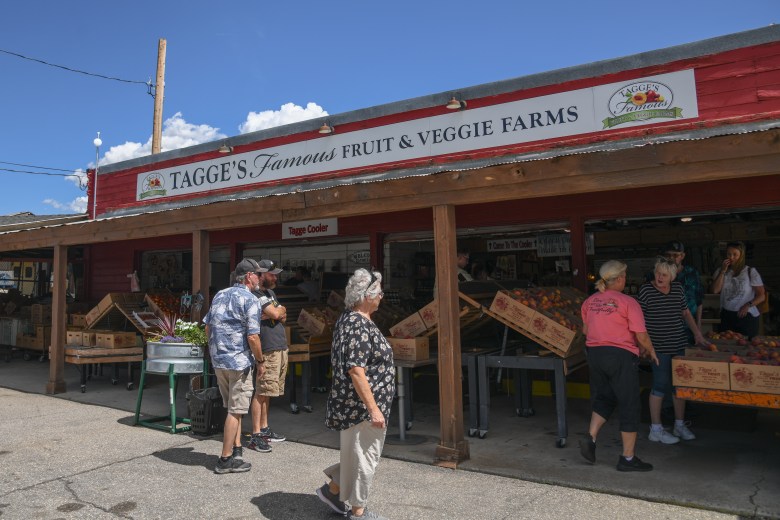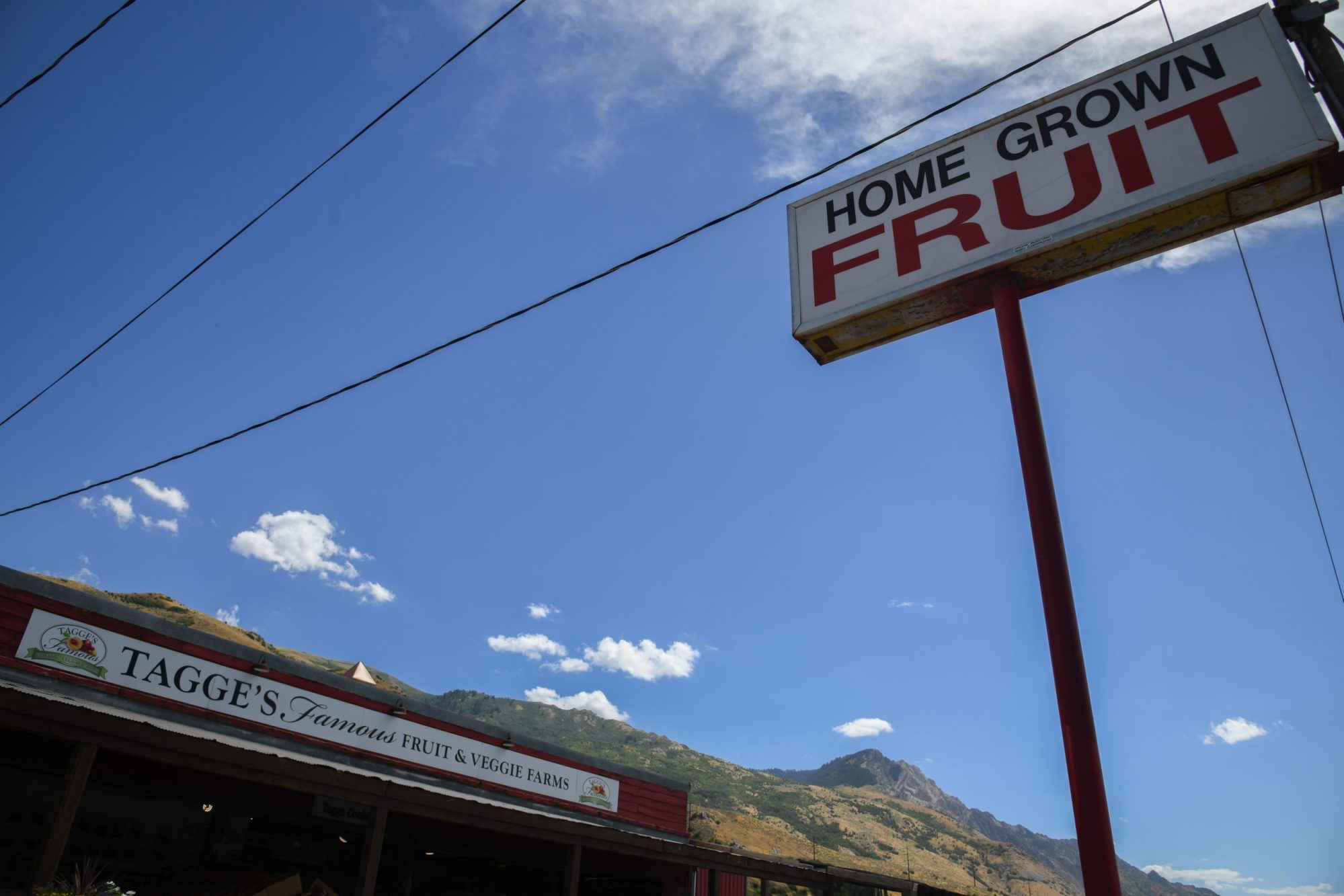A wind-swept cacophony animates the Tagge’s Fruit & Veggie farm stand — sounds of cars, rustling trees and cheery conversation fill the wood-and-metal structure along Highway 89 outside Brigham City, a much bigger version of the Park City stand at S.R. 244 at the entrance to Canyons.
The road north of Salt Lake City was once dotted with farm stands, known for the area’s peaches, when Thayne Tagge and his wife Cari purchased the farm and stand in 1997. But now, their numbers are dwindling.
For these longtime farmers, it’s becoming a scary reality to see fellow growers burn out or pass away, leaving the land no longer ripe for fruit, but for developers. It’s unsurprising given the stunning location: nestled on the hillside in the northernmost part of the Wasatch mountain range, overlooking Willard Bay to the west, dwarfed by Willard Peak to the southeast. Location, location, location.
So, why not sell, join the growing number of retired farmers and end the long hours of hot, sweaty work? Because this land isn’t just special for its beauty, it’s also the perfect microclimate for growing fruit trees, which is why the family decided to place their land into a legacy trust, legally requiring their 130 acres be used for farming and to never be sold. Forever.
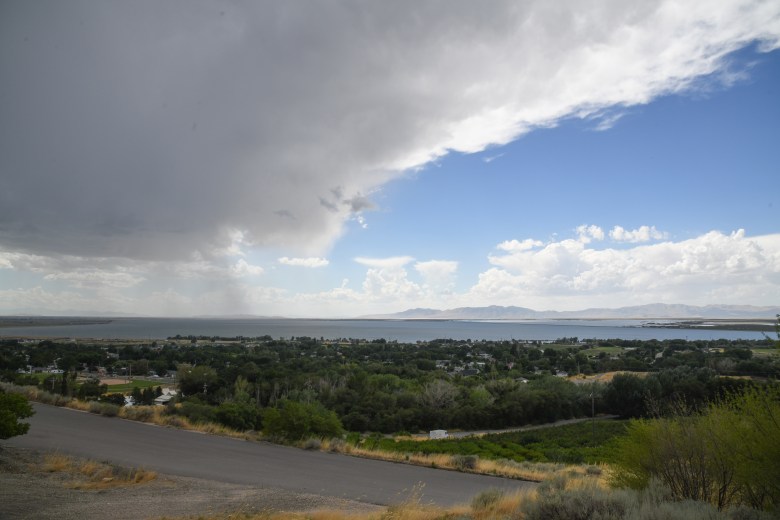
The best use of the land
Thayne and Cari weren’t born into a farming family; they started as sellers, picking raspberries in Bear Lake then selling them at Salt Lake City farmers markets.
Their customers one day asked about peaches, Cari said, so they bought boxes of peaches from a farmer off Highway 89 in Perry to sell at markets, too. A joking remark from Thayne — “I might as well buy your whole farm” — quickly turned into reality, and the farmer agreed to sell the 27-acre plot and stand and trained Thayne to run it.
They had no idea at the time, but they’d basically struck gold.
“This area, because of that mountain breeze, the water, the lake effect, on a hill facing west, it gives us degrees of warmth so we don’t freeze out. This is the best place, I’m saying this, in the state to grow fruit because of those factors,” said Thayne, now 27 years later.
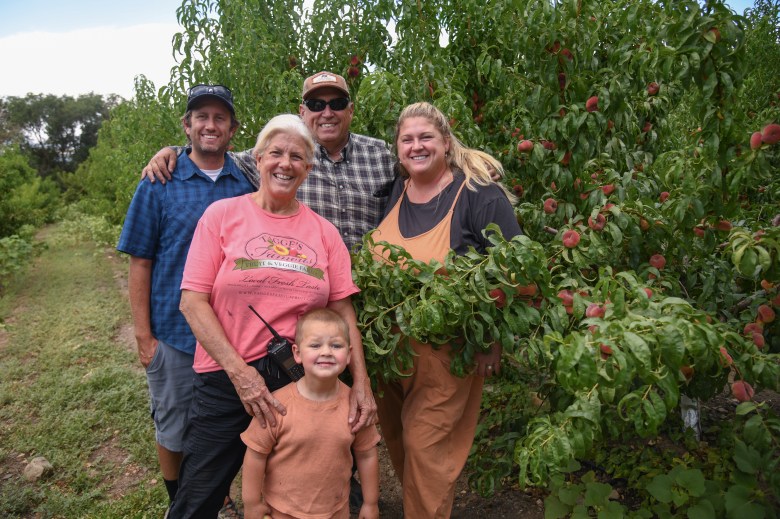
Farmers are at the mercy of the weather, his son Chad says, walking the tightrope between May freezes and August hailstorms. One bad hailstorm can wipe out an entire season’s crops, their entire livelihood. The Tagges’ location protects them from those extremes, but the world keeps trending toward worse.
“Everything now, the word for it is extreme: extreme winds, extreme hail, extreme rain, extreme heat. Everything’s in extreme mode,” said Thayne.
For some neighboring farmers, it’s too hard to sustain, even in an area as rich as theirs.
“We’ve seen farmers sell their land all the time, and this last year, three farmers came to us to buy their orchard to farm, and it just breaks our hearts,” said Cari. “It’s sad to see farmland disappear. It really is. This land, farming is the best use,” Chad adds.
Along with their ideal microclimate, the water access from Pineview Reservoir is key to growing the best produce. Fruit is thirsty, Chad said, and the area’s farmers actually have first water rights to the stores.
And with technology, it’s become even easier — a few taps on his phone, Thayne’s request for water can be delivered to his fields in minutes, distributed through drip irrigation for the best efficiency.
While the area is known for its peaches, with land optimal for stand orchards, it’s proven good for growing all kinds of crops. As the Tagges have purchased more land in the area, they’ve added and experimented with their offerings. Now, they grow 27 varieties of peaches, the newest being their doughnut, or flat, peaches, as well as blackberries, raspberries, nectarines, pears, apples, apricots, cherries, sweet corn, carrots, greens, zucchini, peppers, cabbage, broccoli, lettuce, garlic, potatoes, winter squash, hard squash, tomatoes … the list goes on.
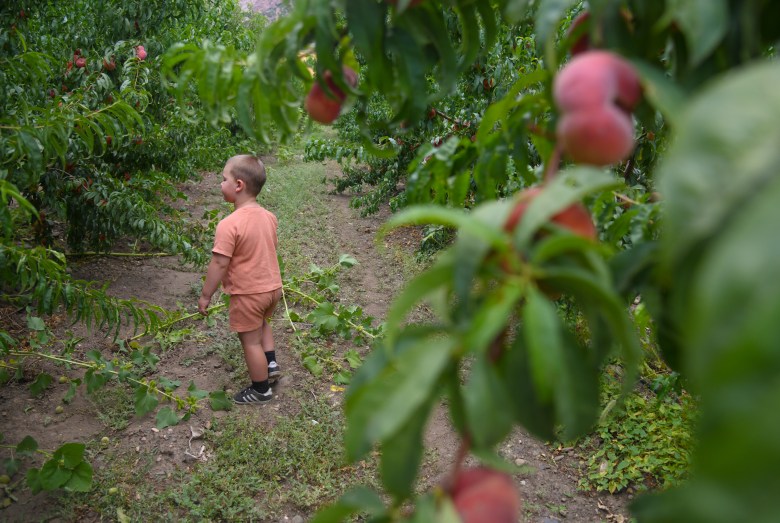
Building a legacy
Though Thayne and Cari didn’t come from farming legacies, they’ve started one. They’re inspiring the next generation to know the benefits of eating from the land.
But first, they have had to work up a clientele, often through adding a personal touch to every interaction. That looks like personally answering every call, Thayne said, counting 92 calls by 1 p.m. just that morning.
“When I first started here, no one would stop at my stand. It sucked because I’m right in the middle,” Thayne said, “Now they’re saying, ‘We only stop at your stand because you’ve got everything, and we appreciate you helping us.’”
They built fruit stands across the valley and in the Wasatch Back, participate in farmers markets from Ogden to Provo every day of the week and distribute through their community-supported agriculture (CSA) produce box program from Logan to Spanish Fork, with now over 1,000 members.
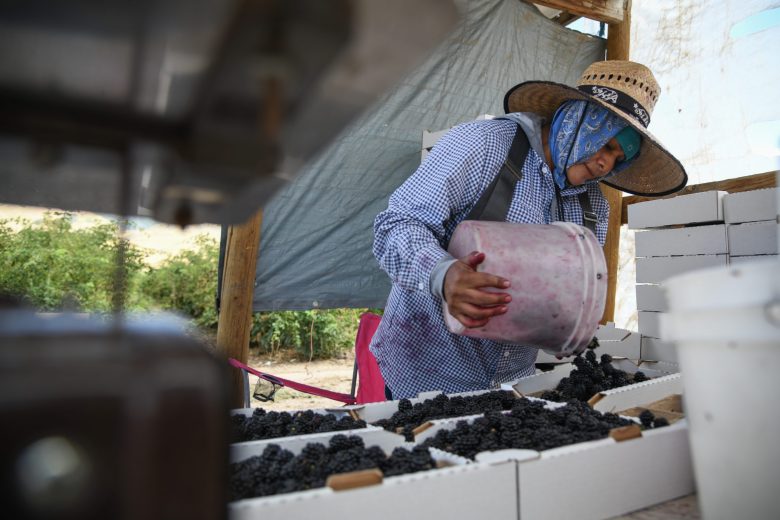
Their “famous” farm is now a massive network and a huge mantle to pass on, and two of their four kids, Laci and Chad, have stepped up to the task.
The two grew up working on the farm, planting seeds, pulling weeds, thinning the peach trees and selling at farm stands.
“My mom would say, ‘Hey ride with me. I’ll give you five bucks to ride with me all day,’” Laci said.
The parents always gave the choice to choose a different career or to carry on their parents’ work. So, Laci stayed, working fulltime to manage their warehouse, distribution and CSA program, getting married and raising her own family in the farm.
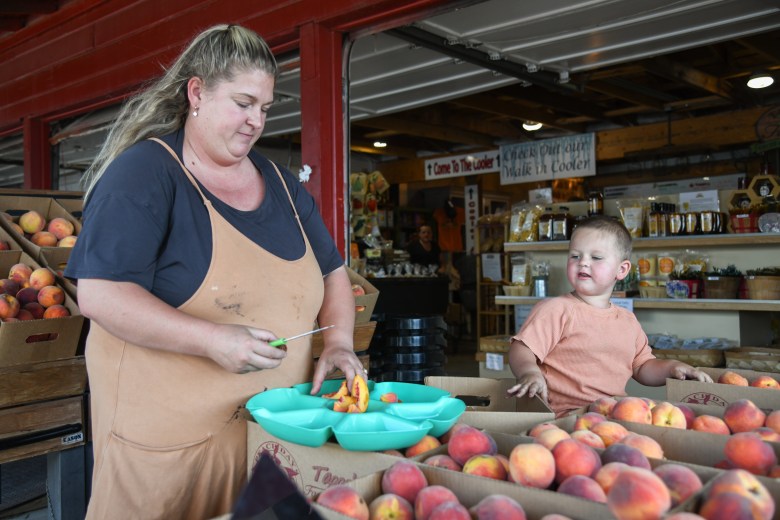
Chad took a detour, moved to Boston to earn a Ph. D. in biomedical engineering. After graduating, he moved back to Utah to work in that career. He was comfortable with a job designing medical equipment. But then he took a second look.
“Eventually it was more of a fear that if (Thayne) passed away, they would be like, ‘Chad, we need your help.’ And I would be in the field like, where’s the pipe that is buried?” Chad said.
So Chad quit his job and came back to the farm, learning side-by-side from his dad on everything it would take to run their operations — not at all a reluctant return, he said.
“I get to work with my dad at the peak of his career, not many people get that opportunity,” Chad said. “How cool is that to be able to see your dad in his element, the peak of his performance and everything, and then get to get all that knowledge passed on.”
For him, it’s not just about getting to work with his dad, but with his kids, too.
“My boy just turned 9 yesterday, and then my other boy is 6, and then I have two daughters, a 10 and a 4 year old, so now they get to work with me. That’s how we were raised, where we were able to work with my parents,” Chad said. “This is just now keeping on a legacy.”
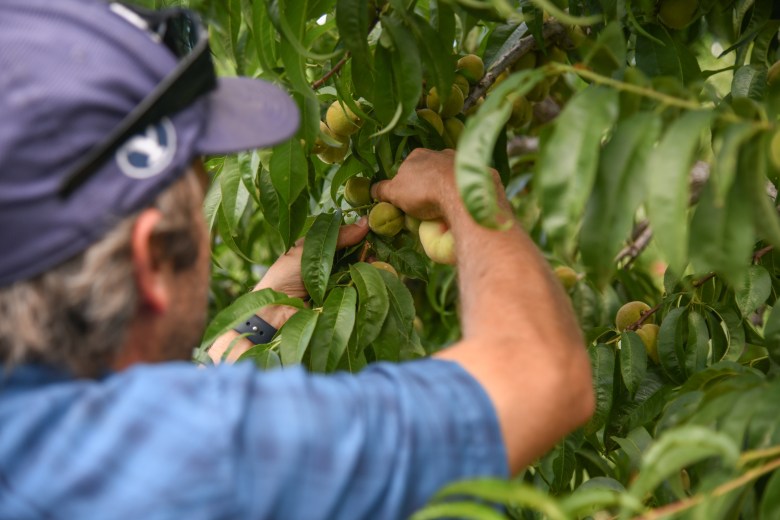
Preservation for the future
The family works together as a carnivalesque blur, with a comfort and freedom particular to familial intimacy. A gentleness to the bickering, a laugh beneath the chide.
In a row of their now 3-year-old doughnut peach trees, Thayne pulls weeds as Chad thins excess green fruit from the branches. Laci’s 4-year-old son, “little” Thayne, and Cari pick the rosy-colored peaches and fill the belly of Cari’s makeshift shirt basket.
Still young, little Thayne is already learning how the farm is run, fingernails ringed in soil, his smile stained with blackberry juice. He walks hand-in-hand with his grandfather through the rows of peach trees, a vision of everything they’ve worked for — and everything they’re committed to preserve.
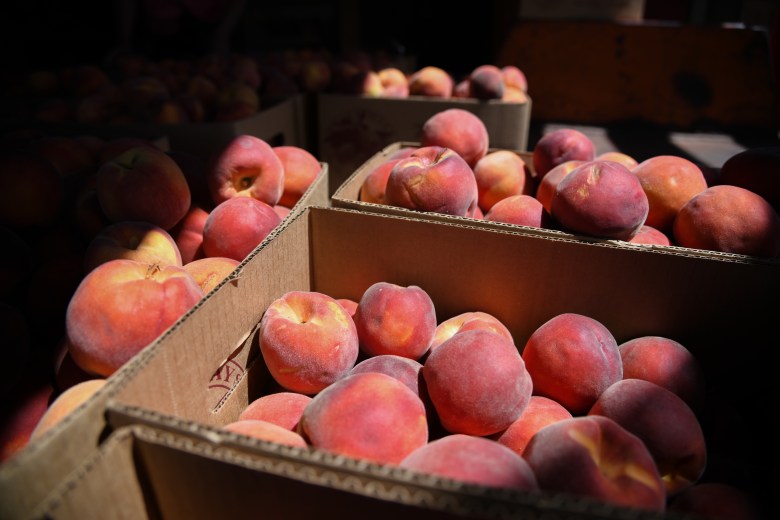
Preserving the land — ensuring its best use, farming, will be its only use. Preserving the jobs — hundreds of employees work to pick, package, distribute and sell their products, and each job would disappear if the land became housing. Preserving the beloved Brigham City peach — a tradition for the greater area, who every September come together to celebrate “Peach Days.”
“It’s got to work. People need to support us, and if they want, we want to stay around,” Thayne said.
With the legacy trust, the land will continue to pass down to two people, requiring that it always be used for farming and that it can never be sold. Any other land the Tagges buy to grow their farm will also be added to the trust.
One of the best ways to support Tagge’s Famous Fruit & Veggie Farm is through their 15-week CSA program, with weekly produce boxes for one, two or four people. Visit their website, taggesfruit.com, to learn more and for information on their farm stands and market locations.
